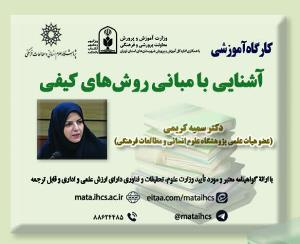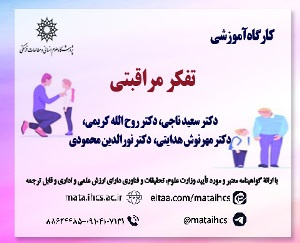بررسی تطبیقی نمودهای انسان گرایی در گلستان سعدی با رویکرد روان شناسی انسان گرا (مقاله علمی وزارت علوم)
درجه علمی: نشریه علمی (وزارت علوم)
آرشیو
چکیده
گلستان سعدی از جمله آثار کلاسیک فارسی است که هم در داخل و هم در خارج از ایران مورد اقبال مردم قرار گرفته است. شاید به این علت که سعدی «انسان» را در مرکزیت قرار می دهد و به همه جنبه های مربوط به او توجه خاص دارد. در گلستان سعدی می توان مفاهیم و مسائلی را یافت که شاخه های مختلف علوم انسانی از جمله فلسفه و روان شناسی متاثر از آن است. به گونه ای می توان گفت سعدی انسان گرایی است که لحظاتی که سوار بر مرکب خیال در وادی حقایق حرکت می کند، بخش ناهشیار وجود او الگوی جامعی از انسان را در اشعار و نوشته هایش ارائه داده است. روان شناسان انسان گرا نیز از هنر انسان شدن سخن به میان می آورند و معتقدند که هرگاه شخصی از مکانیسم های دفاعی، مسئولیت پذیری، سخت کوشی، شیوه های نوین آزمودن و نیازهای درونی خود آگاه باشد و آنها را بشناسد به سوی کمال انسانی راه می یابد. در این مقاله سعی شده است علاوه بر ایجاد ارتباط میان دو علم ادبیات و روان شناسی و قرابت زیاد بین اندیشه های سعدی با اندیشه های روان شناسان انسان گرا، به بررسی تطبیقی مفاهیم انسان گرایی در گلستان سعدی با الگوهای ارائه شده از سوی روان شناسان انسان گرا پرداخته شود. شیوه پژوهش کتابخانه ای و اسناد پژوهی است. یافته های این طرح بیشتر در حوزه شباهت های فکری سعدی و روان شناسان انسان گرا است. نتیجه این گونه پژوهش ها بازکاوی نو از متن و طرح همسانی های اندیشگی میان اندیشمندان است که می تواند زمینه ای خوب برای هم اندیشی فرهنگ ها و مکاتب فکری باشد.A Study of Golestan of Saadi in terms of Humanistic Psychology
Golestan of Saadi is one of the classical Persian literature works which has been warmly accepted both inside and outside Iran; it is perhaps because Saadi sets human at the center and pays special attention to all of his aspects. There can be found some concepts and issues in Golestan which have influenced different branches of humanities such as philosophy and psychology. Therefore, it can be said that Saadi is a person who moves in reality while is "on the horse-back of imagination", i.e., the unconscious part of his being presents a general pattern of human in his poetry. Humanistic psychologists also talk about the art of "becoming human" and believe that whenever one is aware of his defensive mechanisms, responsibility taking, hard-working qualities, new means of evaluations, and internal requirements he can find his way to human perfection. In this paper an attempt has been made to compare humanistic concepts in Golestan with the patterns suggested by the humanistic psychologists, in addition to the development of a relation between literature and psychology and approximation of Saadi's ideas to those of humanistic psychologists. The results of this study show the similarities of the Saadi's ideas to the psychological studies of human which prepare the way to see the amount of relationship between different cultures and schools of thought among nations in terms of understanding human.







